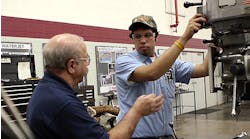Latest from Opinion
Taking a Conscious Approach to Hiring
Many companies, from multinational mega-corporations to neighborhood markets, continue to follow obsolete hiring practices, disproven techniques based on out-of-date principles, adhering to policies that are established and customary. But, these are methods that have been shown to lead to high turnover, stagnant engagement by the staff, and even to poor financial performances. It seems that drones are staffing some HR offices; they hire workers and staff in a completely automatic, unconscious manner. Solving the hiring problems of the 21st Century calls for a spirited, connected system that simplifies the task of selecting the right candidate. It requires a conscious hiring process.
The premise here is that conscious hiring is the lynchpin to workforce optimization and engagement and employee retention, as well as an overall boost to customer service efforts. Hiring consciously means selecting people with a sense of awareness about the roles they are meant to fill, the purpose and outcomes required to successfully validate that roles’ existence, and its cost to the organization. It also describes a sense of mindfulness about who the right type of person is for a particular role. With a conscious hiring mindset, all of these parameters are defined at the beginning of the search. It means the one doing the hiring makes keen decisions that are geared toward the organization’s strategic needs over and above the keywords listed on the resume, and under the pressure to fill a job quickly.
When people are hired and on-boarded by an organization that they are philosophically aligned with, and they are hired into roles that complement their strengths and talents, they perform—and they perform well. When you open your ‘hiring minds’ and take a conscious approach in you’re ‘people on-boarding methods, you streamline your operation: you optimize the workforce, maximize employee retention and engagement, and begin to provide more complete customer service.
Workforce Optimization — When you approach hiring the way you approach improving your golf or tennis game, or running other individual effort, it only makes sense to hire people who will raise the standard for competition, and make everyone better in the process. High performers focus on doing the right things and achieving specific results. Depending upon their role and interests, they focus on making improvements to products and the business at large. An optimized workforce means that the right people are focused on the right things. The right things may be determined as increased sales, operational efficiency, innovation, customer experience or sustainability, as these are the pillars of any organization that has demonstrated long-term success.
Employee Engagement — Among labor academics and HR professionals there is a widespread belief that the lack of employee engagement in the workplace is widespread problem, together with a strong emphasis in business leadership circles that businesses need to continue emphasizing the importance of high productivity. Both of these apparent concerns can be addressed by adopting the conscious hiring mindset. When the majority of people on a project team are highly engaged workers, their attitudes will raise the energy and output of the group. When the opposite occurs, it lowers the energy and output of the work.
Most people are like sponges, absorbing the mood and energy that surrounds them, so those working around them will affect their workplace attitudes. Positivity breeds positivity, and so forth. Work production improves under the guidance of engaged, inspired, and competent people. When you unwittingly hire someone who is not competent, not engaged and whose attention is limited and unfocused, productivity in your organization will be affected accordingly.
Hiring is tricky. Most interviewees know they must present their best qualities and potential in an interview, but they don’t know the effect of being ill equipped for actually doing the specific work under consideration. It is the business manager’s job to know and be aware of that effect, and to head off these problems before they develop.
Employee Retention — A conscious hiring program helps business owners streamline their hiring efforts and maximize hiring effectiveness because it begins by identifying the finished state. Before any advertising is done, or any recruitment begins, the role is assessed and analyzed for a solid understanding of the purpose of the job, and its link to strategic outcomes. Often, too much time is spent with candidates who have spot-on resumes yet lack the fundamental traits to effectively execute the role. In the end, neither the person nor the role delivers on that goal.
Successful organizations understand that they want to keep the right people — those people who contribute to the strategic goals and keep the business improving. When the management focuses on developing their best people, promoting their best qualities and helping them to achieve their individual potential, they improve retention of high-potential employees. Likewise, when the management focuses on fixing and preventing errors, they foster a culture of risk adversity and stagnation. Hiring consciously affords managers time to focus on elevating the work challenges and opportunities for the right people, which leads to stronger employee retention.
Customer Service — Customers’ experience with an organization improves when a person in a customer-facing role authentically cares about service delivery, is detail-oriented, is a proactive problem solver, and has a talent for effective follow-up. The experience one has when, upon entering an establishment the staff are standing around talking as customers wait, is the same experience your customers have when they don’t feel their concerns are addressed or understood.
By contrast, organizations that match their hiring brand with their customer brand attract and on-board the types of people who deliver results to customers, results that are consistent with what has been promised when they initiated their contact with the business. When you match your business values to the values you look for in your workers, they will perform in a manner that reflects those values, and your brand will be enhanced.
When your business ends its outdated hiring methods, begins to engage the selection and employment process intelligently, and then recruits and hires in a conscious manner, the benefits will be appreciated across the organization. Turnover drops, employeeMagi Graziano is the CEO of Conscious Hiring® and Development, and author of “The Wealth of Talent.” Learn more at www.KeenAlignment.com.










